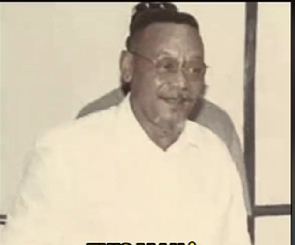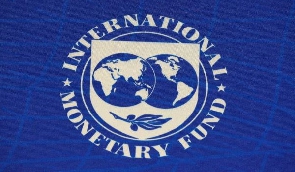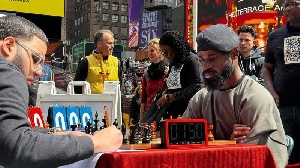Opinions of Tuesday, 23 October 2012
Columnist: Mensah, Dominic
When Politicians Insult the Ghanaian Intellect!
A little girl once asked her father, "Daddy, do all Fairy Tales begin with Once Upon A Time?" The father replied, "No, there is a whole series of Fairy Tales that begin with 'If elected, I promise’..."
It was reported in the news last week that the leader of the National Democratic Party, Nana Konadu Agyemang Rawlings, had claimed that she was in the presidential contest to win and not to reason the downfall of the NDC. Unfortunately, as all know, her confidence of winning the December 2012 elections had to be "squashed" for now. Ghanaians, regrettably, will never have the chance to benefit from her intended goal of "providing the best in education for our children, providing the best health care, developing creative ideas to expand the job market, and implementing policies that could have churned out Ghanaian entrepreneurs to drive the economy." At a prior a news conference leading to her unexpected political exit, she asked:
“What excuse can we give for badly maintained and ill-equipped hospitals, what excuse can we give? What excuse can we give to patients in hospitals who are forced to sleep on the floor because there are no beds available? What excuse can we give to our children as to why there are hardly any public libraries anywhere? What excuse can we give to people who still do not have access to clean, potable water? What excuse can we give for not being creative in expanding the job market? What excuse can we give for poorly equipped schools or having no schools in some communities at all? What excuse can we give when exorbitant prices and unjustified judgment debts are paid?”
As intelligent and daring these questions are (and they must be addressed by the remaining candidates), is it not insulting to the Ghanaian intellect to ask for a another chance to address these issues when she shared the same bedroom and political platform with the man who "autocratically" ruled Ghana for more than tens years and democratically for another eight years?
With less than a month and half to the Ghanaian general election, the promises of Ghanaian politicians have taken on a new dimension. Promises on campaign platforms range from free schooling from basic level to SHS for everyone, reduction in MP's salaries and increment of teachers salaries, provision of good roads, improved health, exponentially increased job opportunities etc., with many more promises and political comedies yet to follow. Does it matter that main roads connecting our major cities are in ruins or that major townships within our cities don’t have running waters and other public services? Come to think of it, since wedding and funeral ceremonies are some of the most expensive things carried out in Ghana, may be our honorable politicians desperate for Ghanaian votes should add these to their lists of gargantuan promises. But on a serious note though, the reasonable voters among the Ghanaian electorate should allow their analytical faculties to engage them in a critical discourse by asking:
"What are Ghanaians being asked to vote for this time? Hasn't each one of the serious candidates been active in Ghanaian politics longer than necessary already? What else do they have to offer Ghanaians today that they couldn't offer them yesterday when they were cabinet ministers, vice presidents, MPs, and so on? Were they like Agyeman Konadu, only at the peripheries of power when the held high public offices, and for that reason couldn't implement any of the ideas they are now campaigning on because they weren't given the chance by their former "autocratic" bosses? What are their former achievements that make them deserve a second chance today? Or could it be that they have suddenly discovered a magical formula that would allow them to transform Ghana within the next four years?"
Will we be reasonable enough to allow the past records of our politicians to influence our decision-making on December 7th? Or must our political candidates perhaps be subjected to the same proceedings that criminals go through in our courtrooms to get them to make viable promises or manage Ghana resources effectively? If witnesses in courtrooms have to swear to the Holy Book to deter them from telling lies, shouldn't the same principle be applied to politicians when constructing their manifestos or singing their campaigning tunes? How beneficiary for Ghana would it be if we could get these politicians to swear to the holy book or any other book or “god” they consider supreme that they wouldn’t make empty promises or consciously lie to the public in exchange for votes. To ensure they take the oath seriously, the last statement of the could always end with: "May God's (Allah, Antoa, etc.) worst curse come upon me and my party leaders if we lie to the Ghanaian electorate or make promises we don't intend to fulfill."
But like a friend said, our honorable men and women wouldn’t hesitate to swear by anything to get the votes they desperately crave for. To the critical observer, it is not hard to identify that it is the voters’ negligence and division that allow these politicians to resort to such shameful tactics and lies. If only we would educate ourselves to understand the viability of their promises, these politicians would stop taking us for rides. As long as a portion of the Ghanaian electorate can afford to trade their votes for t-shirts, cutlasses, bags of rice, sardines and and so on, we are lost with no antidotes to their empty and insulting promises. Only an intellectually challenging mass would get these politicians to act accountably or make viable promises. But as it stands, tribalism, ethnocentrism and other intangibles are the main determinants of our political decision-makings rather than reason. As a group, we don’t always seem to give these men and women who come begging for our votes the impression that we possess any intellects or demand accountability. We follow them blindly just to complain later when they fail to deliver their promises. Logically, we simply cannot hope for good and accountable governance without an informed public marked by keen caution and watchful prudence to demand the right course of actions from its leaders. What follows is to ask who’s going to the provide the general public with the necessary tools to detect the deception of our candidates and also subject our leaders (including our own party leaders) to accountability as our election draws closer. For this election, I am afraid it may be too late. But would we become a wiser electorate by 2016?
Dominic Mensah, ghanafuturenow@gmail.com












